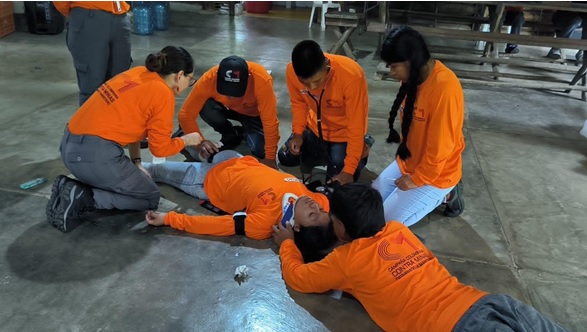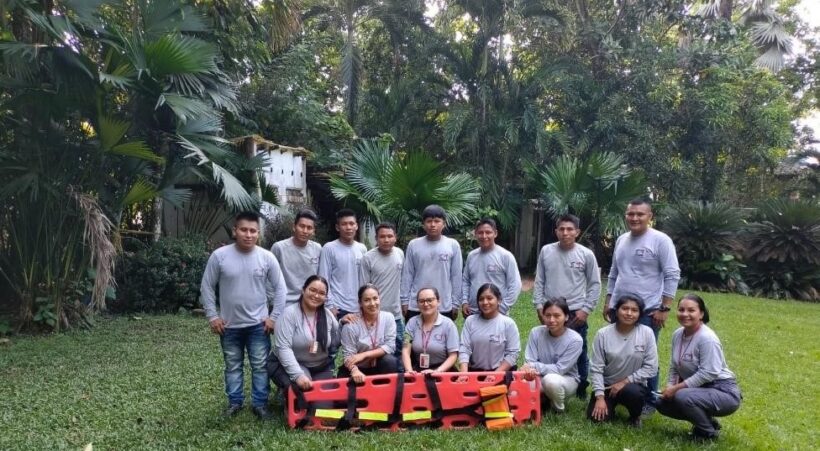The Colombian Campaign Against Mines (CCCM), carries out Humanitarian Demining through activities that lead to the elimination of threats by Explosive Artifacts (EA) in the municipalities of Mutatá, Dabeiba, Murindó and Turbo, located in the west of the country, in the department of Antioquia, promoting the integral development of the communities through the promotion of Humanitarian Disarmament and Human Security.
In Colombia, the CCCM is training personnel from ethnic territories in the Urabá area in Non-Technical Studies (NTS), promoting the participation and inclusion of 11 members of the Embera indigenous people. This training will provide the possibility of accreditation to work in their territory and with their communities in the region.
The organization’s Land Liberation process is based on Humanitarian Demining operations with international standards for Mine Action and the Colombian Technical Standard. CCCM teams are trained in one of the phases of Land Release, which consists of the process of collecting and analyzing information without technical intervention, in addition to training in cross-cutting pillars such as: Community Liaison, Mine Risk Survey (ERM), Gender, First Aid, Peace Building and Information, Quality and Environmental Management.
The course is conducted in the Embera language, thanks to the support and translation of the CCCM facilitators. Natalia Domicó, Embera woman and paramedic, together with Dubalier Domicó, ethnic liaison, will offer during the course topics such as: introduction to trauma, chest wounds, Heimlich maneuver (abdominal compressions), eye injuries, burns, fractures, ophidian accident (snakes), among others.
Encouraging the inclusion of the indigenous community in the Land Liberation processes allows feedback and integration of uses, customs and cosmovision of the ethnic territories to the procedures of Humanitarian Demining. Although there are methodologies subject to technical rigor, the exchange of knowledge strengthens the most effective intervention scenarios, consolidating the mission and vision of the CCCM under the Action without Harm.
In addition, indigenous communities possess ancestral knowledge that prevails from generation to generation, and that, currently, one of the cultural objectives is to preserve those uses and customs in a society that has forgotten the existence and relationship between man and nature, which for ethnic communities is the harmonization with mother earth.
The understanding from the cultural tradition of the technical procedures that are part of Humanitarian Demining generates greater confidence in Resguardos, Cabildos and their representatives. The socialization of the methods and knowledge of Mine Action under the ethnic perspective and approach, responds to the criterion of installed capacity that is materialized in Community Risk Management, especially when non-governmental and humanitarian organizations withdraw from the territories.
Urabá is one of the regions where the organization develops Humanitarian Demining activities and, in order to carry them out, it is essential to have medical support. For this reason, the teams must be prepared to attend any medical eventuality. It is important that all those who carry out field work have basic knowledge of first aid.
“Teaching Western medicine to indigenous communities, which have their own traditional medicine, can be a challenge due to the differences in culture, beliefs and practices; this means that a process of the common agreement must be carried out to transmit and receive the knowledge, adapting the teaching to a practical and applied form,” said Yesika Montaña, the organization’s assistant manager of paramedics.

The course lasts a month and a half and those who meet the requirements may be accredited as investigators and non-technical study leaders by the Organization of American States (OAS). Currently, they have already completed the first first aid module that certifies them as first responders.
“From this point of view, for us as students and for me in particular, these topics are very important, also because our communities need this type of information and, likewise, to be able to apply it directly in the work area where we are assigned, in our ancestral territories and ethnic territories of the Department”, says Milton Sinigui Bailarín, a student belonging to the Embera Eyabida people, from the municipality of Frontino in the Department of Antioquia.
The CCCM affirms that “in this way it promotes diversity, recognizing equal rights, so it is important to actively include members of the affected communities and, together, build free and safe territories for the communities of the country, through spaces for dialogue, consensus and respect for the autonomy of the territories with ethnic belonging”.






